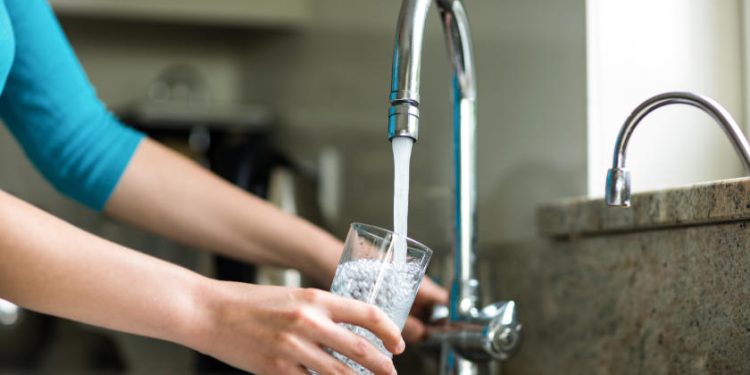What is filtered water? This is a question you may have asked when people talk about the benefits of filtered water compared to regular unfiltered water. Why should we actually filter the water if the water we get in our homes is already sufficiently clean?
Water is an essential part of our health, we need it to survive, and the quality of the water determines how well we will receive nutrients in our body. You may already know this, but water is in charge of transporting nutrients and oxygen to our cells; quality water also aids our digestive system and helps cushion our joints. The benefits of water for our bodies are endless. This is why you always hear “drink enough water” as a tip on all the health blogs and videos.
Yes, we do need to consume enough water throughout the day to stay healthy, but you also need to keep an eye on the quality of water you’re consuming. This is where filtration comes in; water filtration is the process of filtering out all the toxic and harmful contaminants from water. So today, we’ll cover what filtered water is and all the possible know-how of water filtration, how to do it, why you should filter your water, and lastly, where you can find it.
Why Does Water Need to be Purified?
Firstly, let’s start by understanding why exactly we need to filter our water. Around the world, most of the water supply in homes and commercial spaces is municipally treated. This means that the water supply goes through numerous treatments to ensure water is safe to drink. Usually, these treatments mean added chlorine to ensure water is free of waterborne diseases, but this leads to hard water, water which contains excessive levels of chlorine and hard minerals.
Hard water may lead to troubles for your body, skin, care, and even your home. Chlorine is known to dry out the hair and skin, and if you’re struggling with skin conditions such as eczema or rosacea, then it will only be propelled further. Hard water can affect more than your body but the environment around you as well, specifically all your appliances and water sources. If you find dark spots around your sink, faucet, shower, or in the toilet, this is a sure sign you are facing hard water. Hard water may also lead to mineral build-up, corrosion around appliances, and possibly foul odor as well.
Filtering your water ensures you don’t have to face these issues at hand! Not only will you be taking care of your health and ensuring your safety, but you’ll also be preventing all the maintenance headaches. With filtration, regardless of the system you choose, you will be able to soften the hard water and get purified water. Research has shown the great benefits of consuming filtered water.
- Increased water absorption
- Improvement in the metabolic rate
- Shinier hair
- Eliminate all skin troubles – no more irritation and redness
- Higher levels of hydration
These generally are the top benefits you’ll find with filtered water. Though the actual benefits of filtered water differ highly depending on which model or brand of water filter you use, generally, filtered water has greater benefits. What are the different water filters, and which one is the best? Let’s look at the various filter types next.
What are the 3 types of water filters?
We discussed all the phenomenal benefits of water filters, but what are the different filters you can buy? There are numerous models of water filters, each utilizing its own unique method of filtration process to remove toxic contaminants. Not all filters are made the same! Some may be too rudimentary, while others may come with a hefty price tag but impeccable filtration. To make it easy for you, we have compiled three of the most popular and effective water filters on the market.
Granular Activated Carbon (GAC) Water Filter
Granular Activated Carbon (GAC) might actually be the most popular filter available; this is due to its accessibility, high filtration levels, relative affordability, and ease of installation. For the GAC filter, there are numerous brands and models that each offer varying benefits, but the main functionality is the same. As the name will have you believe, the process of filtration occurs with the help of raw carbon material, which is activated once heated. The filtration process happens on the spot; as the water goes through the filter, the carbon is activated, filtering out the impurities. GAC has the ability to remove chlorine, VOCs, and pesticides, but some find GAC to not be as strong as they’d like their filter to be.
All in all, this is a great filter, but if you prefer really advanced filtration systems that will remove all contaminants, then maybe this is not the best option for you.
Ultraviolet (UV) Filter
A stronger filter than the GAC filter is the Ultraviolet (UV) filter, which removes all water contaminants with the help of UV rays. This specific method of water filtration is highly effective, simultaneously having the ability to energize water and eliminate harmful pathogens. This filter is stronger when it comes to eliminating microorganisms, but it may fall short when dealing with possible sediments present in the water.
This filter is really great, but there are two main caveats you’ll face with this filter. Firstly, it can be quite costly, but the second part is that there are certain conditions that need to be met for the water to be filtered correctly. The water should be clear, it requires electricity, and it also doesn’t have the ability to remove foul odor or taste from water.
Reverse Osmosis Filters
Lastly, we have the strongest filter on the market, the Reverse Osmosis filter, which has the ability to eliminate up to 99% of water contaminants, bacteria, pathogens, and viruses. This filter is extremely powerful, and here’s how it filters all the impurities. As the water goes through the filter, it is met with a semipermeable membrane, with pressure water is then pushed through this membrane, effectively leaving behind all the impurities. This powerful tool is a great option to keep your water at peak quality, but there are two major downfalls you may not be able to overlook. Firstly, the price may not be accessible or even acceptable for many, as this is a great tool, but it also comes with a high price tag. You may find this to be a great investment for the future and your body, but some may not.
Secondly, the capability to eliminate almost all water contaminants is its biggest strength and simultaneously its drawbacks. As the filter removes all the impurities, it has difficulty differentiating between the good and the bad, hence removing all the essential minerals and nutrients our bodies need.
Bonus – We have a bonus water treatment system for you! As one of the most innovative and water-intuitive treatments on the market, we will later down the article talk all about vortex water treatment. Keep on reading to find out why this water treatment is so special and unique.
Is Filtered Water the Same as Boiled Water?
From what you read up to now, you might just as easily assume that filtered water is the same as boiled water; they are both essentially removing the impurities, but the simple answer to this is no, they are not the same.
Boiling your water may remove certain bacteria or impurities from the water, but it doesn’t have the power to remove all of the contaminants, especially not chlorine, dirt, and heavy metals. Boiled water is also quite troublesome and time-consuming; you’ll have to first bring your water to a boil and then wait for it to cool down to at least room temperature to drink it. Even when it’s cooled down, the water can taste quite bland and flat, making it that much more difficult to consume water daily. Even if you decide to boil it every day, the process doesn’t eliminate all the impurities while eliminating all the nutrients your body will need from the water.
Water filtration takes away all this hassle by providing you with a convenient, easy, and sure-fire method of fully purified water. For this exact reason, we highly encourage you to invest in a filter rather. Don’t know which filter to go for? No worries, we have a breakdown of the main things you should look for when choosing the right filter.
What is the Best Filtration Method for Water?
You’ve finally decided it is time to buy a filter, but which filter do you choose? Just from this article, we have provided you with 3 (soon to be 4) very differing filter models, and this doesn't include all the brands! So, to make everything easier and more digestible, we’ve created a simple four-step guide you can follow. Now when you are looking to purchase a filter, you can simply remember these four pillars and make your decision.
Power:
The first and most essential you have to determine is just how powerful you need your water filter to be. Are you currently residing in an area that has highly impure water? Possibly your region is supplied with extremely hard water? Then you definitely have to start by looking at stronger filters on the market that will have the power to filter as much of the contaminants and hardness out of the water, possibly even an RO filter. On the opposite spectrum, you may not face these troubles but rather want to have a water filter as a precautionary tool or just to soften your slightly hard water; then you can opt for less powerful filters, maybe the GAC filter.
Cost:
The cost is another key component that may make or break the filter, so before making the purchase sit down to think about the budget, really think about the budget. This will include the initial upfront cost of the filter as well as the future maintenance fees that may come up. Are you willing to invest more right now and have less frequent future maintenance in the future, or is that not feasible? Maybe cartridge maintenance is not a big deal for you but coughing up the large sum is, then you can choose a different model that can tick all your boxes.
Maintenance:
We already mentioned this in the cost section, but filter maintenance is another major factor you have to think about. Some filters require monthly replacement, and others quite possibly may never require it. Maybe you like the filter's price and the power, but it requires maintenance and replacement every 3 to 6 months. Is this a deal breaker? Make sure to ask when purchasing and reading on the filter to find out just how much effort it will require from you.
Size:
Lastly, we have the fourth and final factor, which is the size of the filter. Realistically speaking, we might all want an RO filter in the kitchen, but just how much free space do we have? Can we fit a multiple-stage under-the-counter water filter in our home, or do we only have space for the small filter that is attached to the faucet? You might love the filter, and it can tick all the other boxes but just make sure it can fit in your home.
These are some of the essential factors we found can help make the important decision of choosing the right filter.
Is Vortex Water the Same as Filtered Water?
We mentioned the bonus water purification method, and here it is, the secret to top-quality water, and that is vortex water! What is vortex water, and is it the same as filtered water? Vortex water is more than just filtered water; it is water in its most optimal state with naturally occurring properties such as self-cleaning and balanced pH levels.
Before we start understanding what vortex water treatment is, let’s first start looking at what vortex water actually is. Vortex water is more than just filtered water because vortex water can be found in nature, where water is in its most pure form. This phenomenon happens as water flows freely through nature, creating hexagonal micro-clustered molecular forms which can be found in spring waters and glacial melts. This type of water is also often referred to as structured water. Vortex water has numerous benefits that you may not be able to get from simple filtered water, as vortex water is not only fully purified, but it ensures no essential minerals are lost. Here are some of the most prominent benefits of vortex water:
- Water is naturally self-cleaning continuously. This leads to fully purified and clean water constantly, also becoming more robust against all harmful contaminants.
- Water pH balance is something you have to keep in mind; certain water filters may filter the impurities but lead to off-balanced pH levels. Having neutral pH levels that fall between 6.8 and 7.2 is essential to keep your gut health in good condition. Vortex water ensures that its own pH balance never skews to alkaline or acidic.
- Vortex water has increased levels of Dissolved Oxygen (DO). DO is crucial to the survival of aquatic biota and our environment.
These are just some of the benefits of vortex water; you can find even more advantages from vortex water for your body, environment, and your home. So how can you get vortex water in your home? With Vortex Water treatment!
As the structured water is taken out of its natural environment, the benefits are lost, mostly due to unnatural water treatments and excess chemical additives. Vortex water treatments vary, but their main aim is to recreate the motion water would otherwise go through in nature and restore its inner structure.
Where To Buy A Water Filter System?
So, where can you purchase your desired water filter system? The answer is simple; it depends on the model you want. You can find most of the water filters in a store near you, but maybe it would be better to purchase them online, whether it is on amazon or on the brand’s website. Online may be better because the options are endless; you can find the exact model you might want for your home.
What if you want to purchase vortex water treatment? Then we have the best place and offer for you – The Vortex Water Revitalizer™! With the double spiral vortexing method, water’s inner structure is restored and revived, bringing vortex water right into your home or business.
The Vortex Water Revitalizer™ is not only affordable but convenient, but it is easy to install and doesn’t require constant future maintenance. Not only that, you’ll receive a 60-Day Money-Back Guarantee and a 10-Year Limited Warranty with every purchase. So what are you waiting for? Find your ideal vortex water treatment match on The Vortex Water Revitalizer™.

























